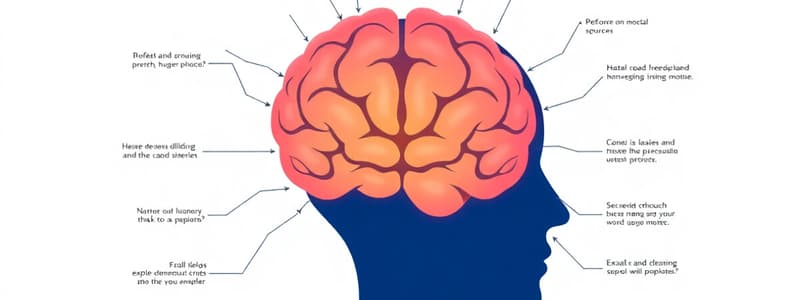Podcast
Questions and Answers
What is psychology?
What is psychology?
The scientific study of mind and behavior.
What is the name of the first laboratory for psychological research?
What is the name of the first laboratory for psychological research?
- Ivan Pavlov's Laboratory
- William James's Laboratory
- Sigmund Freud's Laboratory
- Wilhelm Wundt's Laboratory (correct)
What are the main ideas behind structuralism?
What are the main ideas behind structuralism?
Understanding the conscious experience through introspection, breaking down the mind into its basic parts.
Which school of psychology focused on how mental activities helped an organism adapt to its environment?
Which school of psychology focused on how mental activities helped an organism adapt to its environment?
Who is considered the founder of American Psychology?
Who is considered the founder of American Psychology?
What is the core idea behind the Psychoanalytic Theory?
What is the core idea behind the Psychoanalytic Theory?
According to psychoanalytic theory, one way to access the unconscious mind is through what?
According to psychoanalytic theory, one way to access the unconscious mind is through what?
What is the focus of Gestalt Psychology?
What is the focus of Gestalt Psychology?
What is the meaning of the German word 'Gestalt'?
What is the meaning of the German word 'Gestalt'?
What is Behaviorism's main focus?
What is Behaviorism's main focus?
What are the names of the main figures who contributed to Behaviorism?
What are the names of the main figures who contributed to Behaviorism?
What is the core idea behind Humanism?
What is the core idea behind Humanism?
Which two individuals are most prominent in Humanism?
Which two individuals are most prominent in Humanism?
What is the name of the hierarchy of needs proposed by Abraham Maslow?
What is the name of the hierarchy of needs proposed by Abraham Maslow?
What is the name of the therapy method developed by Carl Rogers?
What is the name of the therapy method developed by Carl Rogers?
What are the three key elements that Rogers believe are necessary for therapists?
What are the three key elements that Rogers believe are necessary for therapists?
Which of the following are considered branches of contemporary psychology? (Select all that apply)
Which of the following are considered branches of contemporary psychology? (Select all that apply)
What is the main focus of Biopsychology?
What is the main focus of Biopsychology?
Which of the following are studied within Biopsychology? (Select all that apply)
Which of the following are studied within Biopsychology? (Select all that apply)
What are two key components of Sensation and Perception?
What are two key components of Sensation and Perception?
What are the five factors of the Five Factor Model in Personality Psychology?
What are the five factors of the Five Factor Model in Personality Psychology?
What are the general characteristics of people with high openness to experience?
What are the general characteristics of people with high openness to experience?
What are the general characteristics of people high in conscientiousness?
What are the general characteristics of people high in conscientiousness?
What is another name for extraversion?
What is another name for extraversion?
What are the general characteristics of people high in agreeableness?
What are the general characteristics of people high in agreeableness?
What are the general characteristics of people high in neuroticism?
What are the general characteristics of people high in neuroticism?
What is the main focus of Social Psychology?
What is the main focus of Social Psychology?
Which of the following are key study areas within Social Psychology? (Select all that apply)
Which of the following are key study areas within Social Psychology? (Select all that apply)
What is the main focus of Health Psychology?
What is the main focus of Health Psychology?
What model within health psychology suggests that health is determined by an interaction of biological, psychological, and social factors?
What model within health psychology suggests that health is determined by an interaction of biological, psychological, and social factors?
What is the focus of Clinical Psychology?
What is the focus of Clinical Psychology?
What is one common approach used by clinical psychologists when providing therapy?
What is one common approach used by clinical psychologists when providing therapy?
What is the main focus of Industrial-Organizational Psychology?
What is the main focus of Industrial-Organizational Psychology?
What is the main focus of Sport and Exercise Psychology?
What is the main focus of Sport and Exercise Psychology?
What is the main focus of Forensic Psychology?
What is the main focus of Forensic Psychology?
What is the role of a forensic psychologist in the legal system?
What is the role of a forensic psychologist in the legal system?
What are the minimum educational requirements for most careers in psychology?
What are the minimum educational requirements for most careers in psychology?
Which of the following are common career paths for individuals with a degree in psychology? (Select all that apply)
Which of the following are common career paths for individuals with a degree in psychology? (Select all that apply)
What is the name of the first woman to earn a doctorate in psychology?
What is the name of the first woman to earn a doctorate in psychology?
Who is famous for his theories about changes in cognitive ability as we move from infancy to adulthood?
Who is famous for his theories about changes in cognitive ability as we move from infancy to adulthood?
What is the main focus of Developmental Psychology?
What is the main focus of Developmental Psychology?
What is the name of the cognitive revolution?
What is the name of the cognitive revolution?
Flashcards
What is Psychology?
What is Psychology?
The scientific study of the mind and behavior, encompassing everything from basic brain function to complex human experiences like consciousness, memory, and personality.
Structuralism
Structuralism
A historical school of psychology that focused on analyzing the conscious experience into its basic elements through introspection, like breaking down a song into its individual notes.
Functionalism
Functionalism
A historical school of psychology that emphasized how mental activities help an organism adapt to its environment. It explored how the mind functions to help us survive and thrive.
Introspection
Introspection
Signup and view all the flashcards
Psychoanalytic Theory
Psychoanalytic Theory
Signup and view all the flashcards
Gestalt Psychology
Gestalt Psychology
Signup and view all the flashcards
Behaviorism
Behaviorism
Signup and view all the flashcards
Humanism
Humanism
Signup and view all the flashcards
Classical Conditioning
Classical Conditioning
Signup and view all the flashcards
Operant Conditioning
Operant Conditioning
Signup and view all the flashcards
Maslow's Hierarchy of Needs
Maslow's Hierarchy of Needs
Signup and view all the flashcards
Client-Centered Therapy
Client-Centered Therapy
Signup and view all the flashcards
Biopsychology
Biopsychology
Signup and view all the flashcards
Sensation and Perception
Sensation and Perception
Signup and view all the flashcards
Cognitive Psychology
Cognitive Psychology
Signup and view all the flashcards
Developmental Psychology
Developmental Psychology
Signup and view all the flashcards
Personality Psychology
Personality Psychology
Signup and view all the flashcards
Social Psychology
Social Psychology
Signup and view all the flashcards
Health Psychology
Health Psychology
Signup and view all the flashcards
Clinical Psychology
Clinical Psychology
Signup and view all the flashcards
Forensic Psychology
Forensic Psychology
Signup and view all the flashcards
Industrial-Organizational Psychology
Industrial-Organizational Psychology
Signup and view all the flashcards
Sports and Exercise Psychology
Sports and Exercise Psychology
Signup and view all the flashcards
Biopsychosocial Model
Biopsychosocial Model
Signup and view all the flashcards
Five Factor Personality Model
Five Factor Personality Model
Signup and view all the flashcards
Cognitive Revolution
Cognitive Revolution
Signup and view all the flashcards
Personality Traits
Personality Traits
Signup and view all the flashcards
Sigmund Freud
Sigmund Freud
Signup and view all the flashcards
Margaret Floy Washburn
Margaret Floy Washburn
Signup and view all the flashcards
B.F. Skinner
B.F. Skinner
Signup and view all the flashcards
Study Notes
Introduction to Psychology
- Psychology is the scientific study of the mind and behavior.
- It encompasses everything about the human experience, from brain functions to consciousness, memory, language, reasoning, personality, and mental health.
Historical Perspectives
- Structuralism: Examines conscious experience through introspection (self-examination). Pioneered by Wilhelm Wundt.
- Functionalism: Focuses on how mental processes help organisms adapt to their environment. Pioneered by William James.
- Psychoanalytic Theory: Emphasizes the role of the unconscious mind in influencing behavior. Founded by Sigmund Freud.
- Gestalt Psychology: Emphasizes the "whole" experience rather than individual parts. Key figures include Wertheimer, Koffka, and Kohler.
- Behaviorism: Focuses on observable behaviors and how they can be learned and controlled. Key figures include Pavlov, Watson, and Skinner.
- Humanism: Highlights human potential for growth and fulfillment, and the innate goodness of humans. Key figures include Maslow and Rogers.
Key Figures
- Wilhelm Wundt: Founder of the first psychology laboratory, considered a founder of psychology and a pioneer of structuralism.
- William James: First American psychologist, establishing functionalism.
- Sigmund Freud: Developed psychoanalytic theory, emphasizing the role of the unconscious mind.
- Ivan Pavlov: Discovered classical conditioning, elucidating stimulus-response connections in learning.
- John B. Watson: Known as the father of behaviorism. Argued for objective analysis of observable behavior.
- B.F. Skinner: Studied operant conditioning (reinforcement and punishment).
- Abraham Maslow: Proposed a hierarchy of needs in motivating behavior.
- Carl Rogers: Developed client-centered therapy, emphasizing empathy and unconditional positive regard.
- Margaret Floy Washburn: First woman to earn a Ph.D. in psychology and conducted research on animal behavior.
Modern Branches of Psychology
- Biopsychology: Studies the biological basis of behavior.
- Sensation and Perception: Examines sensory information and its interpretation.
- Personality Psychology: Explores enduring patterns of thought, feeling, and behavior.
- Social Psychology: Investigates how individuals interact and relate with one another.
- Health Psychology: Examines the relationship between psychological factors and physical health.
- Clinical Psychology: Focuses on diagnosis and treatment of psychological disorders.
- Industrial-Organizational Psychology: Applies psychological concepts to workplace settings.
- Sports and Exercise Psychology: Studies psychological aspects related to sports and physical performance.
- Developmental Psychology: Examines physical and mental development across the lifespan.
- Forensic Psychology: Applies psychological principles to the legal system.
Cognitive Revolution
- 1950s: Emergence of new disciplinary perspectives (linguistics, neuroscience, computer science) made the mind a focus of scientific study.
- Noam Chomsky was instrumental in beginning the cognitive revolution, emphasizing mental functioning in behavior.
Cognitive-Behavioral Therapy (CBT)
- A therapeutic approach that considers thoughts, emotions, and behaviors together.
Job Opportunities Related to Psychology
- Many employment options are available to those with bachelor's and even master's degrees in psychology.
- Some top occupations include management, sales, social work, and healthcare roles.
Employment Sectors for Psychology Doctorates
- Psychologists with doctoral degrees can be employed in numerous sectors.
- Common employment sectors include universities, hospitals, government agencies, businesses, and related educational settings.
Studying That Suits You
Use AI to generate personalized quizzes and flashcards to suit your learning preferences.




